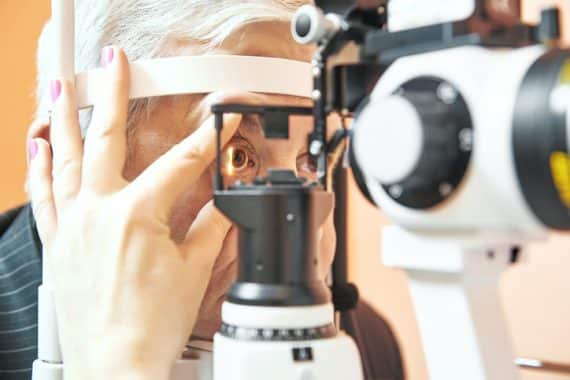Eye Specialist for Glaucoma Cape Coral
Have you heard about glaucoma? What is this disease? Are you at risk? All of these questions can be answered by our eye specialist for glaucoma in the Cape Coral office of Elmquist Eye Group. Let’s explore the risk factors in more detail.
Who is at risk for glaucoma?
 There are several types of glaucoma, with open-angle glaucoma being the most prevalent. Healthy individuals with healthy eyes can develop open-angle glaucoma. Why? There are several determining risk factors.
There are several types of glaucoma, with open-angle glaucoma being the most prevalent. Healthy individuals with healthy eyes can develop open-angle glaucoma. Why? There are several determining risk factors.
Older age is a large risk factor. In general, people over age 60 are at higher risk, but African Americans and Hispanics are at higher risk at a younger age (over age 40). Family history is also a risk factor, and people with thinner corneas also seem to be more at risk. Diabetes may also be associated with the progression of open-angle glaucoma, and scientists are also studying the association of nutritional factors with the disease.
While more research is needed, risk factors have been researched in large studies like the Barbados Incidence Study of Eye Diseases (BISED). People in the study had baseline measurements and were reexamined after certain time periods for risk factors and how they related to the incidence of disease. The BISED study sampled a population of African descent, a population which seems to have a higher risk for glaucoma. Other large studies include the Melbourne Visual Impairment Project (VIP) in Australia and the Rotterdam Eye Study (RES) in the Netherlands.
In all three studies, older age was found to be the most relevant risk factor. For example, people in the 70 to 79 year age range were 12 times more likely to develop open-angle glaucoma within five years compared to subjects 30 years younger. Also in all three studies, patients who had an intraocular pressure (the pressure inside the eye) of 1 mmHg higher than the average population were also about 10 to 15 percent more likely to develop open-angle glaucoma.
Interestingly, patients who used calcium channel blocker drugs for hypertension were more likely to develop open-angle glaucoma as well. In these three studies, diabetes was not a risk factor, but diabetes has been reported as a possible risk factor in other studies.
What’s the treatment for glaucoma?
Despite risk factors, each person is unique. What is a normal eye pressure for one person is high for another person. Glaucoma occurs over time and rarely exhibits any symptoms. This is why annual eye exams, the only way to truly detect glaucoma, are so important. There is one sudden-onset form of glaucoma called angle-closure glaucoma. It is a rapid progression of the disease and you should proceed to the nearest emergency room if you have severe eye pain, blurred vision and nausea. Eyesight can be lost in one day, so it is important to seek immediate treatment.
The majority of glaucoma cases are the other form, called open-angle glaucoma, which occurs over many years. Our surgeons use medicines and perform surgeries to treat glaucoma. If you have the disease, it is important to start treatment right away; we can’t reverse any vision loss or damage that has already occurred but our treatments can keep the condition from getting worse.
Prescription eye drops are often given to lower the internal eye pressure. High pressure damages the optic nerve over time, so we are seeking to prevent optic nerve damage with these treatments.
Our board-certified surgeons perform laser treatments and surgeries, both also designed to lower the internal eye pressure by helping fluid drain from the eye. There are several different types of these fluid-draining procedures.
Let’s talk it over
If you are at risk for glaucoma, come see us. Let’s talk it over. Glaucoma is a serious condition, and you should definitely have an eye specialist in Cape Coral for glaucoma, and many other eye conditions as well. We’ve been serving southwest Florida for over two decades, so give us a call today and make an appointment with the experienced team at Elmquist Eye Group.
